|
|
|
Sort Order |
|
|
|
Items / Page
|
|
|
|
|
|
|
| Srl | Item |
| 1 |
ID:
155144
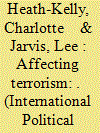

|
|
|
|
|
| Summary/Abstract |
The contemporary fascination with terrorism in Anglo-American popular culture, political discourse, news reportage, and beyond is boundless and well documented. In this article, we explore contemporary productions of terrorism as the outcome of three drives to knowledge: laugher, lamentation, and detestation. Drawing on a range of social and cultural practices—including jokes, street art, film, memorial projects, elite rhetoric, and abuse scandals—we make two arguments. First, that humor, grief, and hatred underpin and saturate the contemporary desire to know terrorism. And, second, that—although these drives function in multiple and ambiguous ways—they serve to institute a distance between the subject and object of terrorism knowledge, not least by encouraging us to laugh at those punished for terrorism, mourn for those lost in attacks, and direct our hatred toward those responsible. This analysis not only opens fresh insight into the workings of terrorism discourse in the post-9/11 period, it also points to connections between contemporary “critical” work on terrorism and debate on the role of emotions and affect in international politics more broadly.
|
|
|
|
|
|
|
|
|
|
|
|
|
|
|
|
| 2 |
ID:
132231
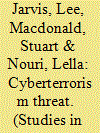

|
|
|
|
|
| Publication |
2014.
|
| Summary/Abstract |
This article reports on a recent research project exploring academic perspectives on the threat posed by cyberterrorism. The project employed a survey method, which returned 118 responses from researchers working across 24 different countries. The article begins with a brief review of existing literature on this topic, distinguishing between those concerned by an imminent threat of cyberterrorism, and other, more skeptical, views. Following a discussion on method, the article's analysis section then details findings from three research questions: (1) Does cyberterrorism constitute a significant threat? If so, against whom or what?; (2) Has a cyberterrorism attack ever taken place?; and (3) What are the most effective countermeasures against cyberterrorism? Are there significant differences to more traditional forms of anti- or counterterrorism? The article concludes by reflecting on areas of continuity and discontinuity between academic debate on cyberterrorism and on terrorism more broadly.
|
|
|
|
|
|
|
|
|
|
|
|
|
|
|
|
| 3 |
ID:
188761


|
|
|
|
|
| Summary/Abstract |
This article reports on a survey of researchers designed to capture current perspectives on core questions around cyberterrorism. The survey—conducted in 2017 as a follow-on to an initial, 2012, exercise—focused on questions of definition, threat and response. By documenting our findings in each of these areas—and highlighting developments in the years between our surveys—we identify three particularly important trends. First, an increasing convergence around the core characteristics of cyberterrorism, albeit with continuing conceptual disagreements at the concept’s penumbra. Second, increasing researcher concern with the threat posed by cyberterrorism, underpinned by a widespread view that this threat has increased, and a growing feeling that cyberterrorist attacks have now taken place. Third, support for a diversity of counter-measures to this threat, although perhaps counter-intuitively little suggestion that resort to exceptional or draconian measures is needed. In order to inform future research, the article concludes by detailing some of the major limitations, gaps and weaknesses within academic research to date as identified by our respondents.
|
|
|
|
|
|
|
|
|
|
|
|
|
|
|
|
| 4 |
ID:
152407
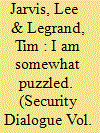

|
|
|
|
|
| Summary/Abstract |
A recent wave of scholarship has drawn attention to the need for further engagement with the role of ‘the audience’ in securitization ‘games’. This article contributes to this discussion both theoretically and empirically by exploring the types of question an audience may ask of a securitizing actor before a securitizing act meets with success or failure. To do this, it offers a discursive analysis of all 27 UK parliamentary debates on the extension of proscription powers to additional terrorist organizations between 2002 and 2014. We argue first that these debates are characterized by a wide range of questions relating to the timing, criteria, mechanics, consequences and exclusions of proscription; and second, that these questions function as demands upon the executive to variously justify, explain, clarify, elaborate and defend decisions to extend the UK’s list of designated groups. Taking these questions seriously, we suggest, therefore allows insight into a variety of ways in which audiences might participate in security politics that are not adequately captured by notions of consent or resistance, or success or failure. This has empirical and theoretical value for understanding proscription, parliamentary discourse and securitization alike.
|
|
|
|
|
|
|
|
|
|
|
|
|
|
|
|
| 5 |
ID:
145515
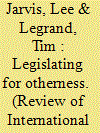

|
|
|
|
|
| Summary/Abstract |
This article offers a discursive analysis of UK Parliamentary debate on the proscription of terrorist organisations between 2002 and 2014. It argues that these debates play an important constitutive role in the (re)production of national Self and terrorist Other that remains largely overlooked in existing work on this counter-terrorism mechanism. The article begins with an overview of this literature, arguing it is overwhelmingly oriented around questions of efficacy and ethics. While important, this focus has concentrated academic attention on the causal question of what proscription does, rather than the constitutive question of what is made possible by proscription. The article’s second section situates our analysis within discursive work in International Relations, upon which we investigate three pervasive themes in Parliamentary debate: (i) Constructions of terrorism and its threat; (ii) Constructions of specific groups being proscribed; and, (iii) Constructions of the UK Self. We argue that these debates (re)produce an antagonistic relationship between a liberal, open, and responsible UK mindful of cultural and religious difference, on the one hand. And, on the other, its illiberal, irrational terrorist Others conducting immoral violences on behalf of particularistic identity claims. This analysis, we conclude, has significance for contemporary debate on security politics, as well as for studies of counter-terrorism and international politics more generally.
|
|
|
|
|
|
|
|
|
|
|
|
|
|
|
|
| 6 |
ID:
159889
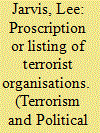

|
|
|
|
|
| Summary/Abstract |
This article serves as an introduction to this Special Issue on the banning or proscription of terrorist organisations around the world. It begins by arguing for greater attention to proscription powers because of their contemporary ubiquity, considerable historical lineage, implications for political life, and ambiguous effectiveness. Following an overview of the Issue’s questions and ambitions, the article discusses five themes: key moments of continuity and change within proscription regimes around the world; the significance of domestic political and legal contexts and institutions; the value of this power in countering terrorism and beyond; a range of prominent criticisms of proscription, including around civil liberties; and the significance of language and other symbolic practices in the justification and extension of proscription powers. We conclude by sketching the arguments and contributions of the subsequent articles in this Issue.
|
|
|
|
|
|
|
|
|
|
|
|
|
|
|
|
| 7 |
ID:
086327
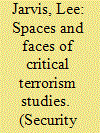

|
|
|
|
|
| Publication |
2009.
|
| Summary/Abstract |
This article explores the burgeoning academic interest in establishing a critical terrorism studies research programme. It begins by reviewing the debates over definition, causation and response that still dominate mainstream discussions of terrorism. The analytical and normative limitations of these debates, it argues, open considerable space for the emergence of a critically oriented body of literature. A second section then explores two distinct efforts at overcoming these limitations: the broadening and interpretivist faces of critical terrorism studies. The broadening face refers to attempts to expand our understanding of terrorism beyond non-state violence alone, while the interpretivist face comprises critical explorations of terror in image and narrative. Although each of these approaches offers scholars a more engaged role than the problem-solving orientation of the mainstream debates, the article argues that only the interpretivist face is capable of addressing their analytical limitations. The article concludes by calling for further attention to the notion of critique within the relevant critical literature.
|
|
|
|
|
|
|
|
|
|
|
|
|
|
|
|
| 8 |
ID:
164454
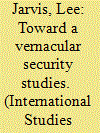

|
|
|
|
|
| Summary/Abstract |
This article seeks to situate, evaluate, and advance the recent “turn” toward the “vernacular” within security studies. It argues that vernacular security studies has significant advantages over alternative “bottom up” approaches. First, its conceptual emptiness allows for genuinely inductive research into public experiences, understandings, anxieties, and fears. Second, it offers engagement with a potentially far richer tapestry of everyday (in)securities by refusing to prioritize particular populations by virtue of their identity or sociopolitical position. And, third, such an approach avoids the universalism inherent within related, yet more explicitly cosmopolitan, approaches to security. The article begins by situating vernacular security studies within relevant intellectual and (geo-)political dynamics from the late twentieth century. A second section distinguishes this approach from six alternative traditions with a similar emphasis on individual human referents: human security, critical security studies, postcolonialism, feminism, ontological security studies, and everyday security studies. The article then elaborates on the significance and added value of vernacular approaches to security, before outlining core conceptual, methodological, and ethical questions for future research.
|
|
|
|
|
|
|
|
|
|
|
|
|
|
|
|
| 9 |
ID:
151571
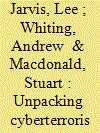

|
|
|
|
|
| Summary/Abstract |
This article explores original empirical findings from a research project investigating representations of cyberterrorism in the international news media. Drawing on a sample of 535 items published by 31 outlets between 2008 and 2013, it focuses on four questions. First, how individuated a presence is cyberterrorism given within news media coverage? Second, how significant a threat is cyberterrorism deemed to pose? Third, how is the identity of ‘cyberterrorists’ portrayed? And, fourth, who or what is identified as the referent – that which is threatened – within this coverage? The article argues that constructions of specificity, status, and scale play an important, yet hitherto under-explored, role within articulations of concern about the threat posed by cyberterrorism. Moreover, unpacking news coverage of cyberterrorism in this way leads to a more variegated picture than that of the vague and hyperbolic media discourse often identified by critics. The article concludes by pointing to several promising future research agendas to build on this work.
|
|
|
|
|
|
|
|
|
|
|
|
|
|
|
|
| 10 |
ID:
121858


|
|
|
|
|
| Publication |
2013.
|
| Summary/Abstract |
This article draws on primary focus group research to explore the differing ways in which UK publics conceptualise and discuss security. The article begins by situating our research within two relevant contemporary scholarly literatures: The first concerns efforts to centre the 'ordinary' human as security's referent; the second, constructivist explorations of security's discursive (re)production. A second section then introduces six distinct understandings of security that emerged in our empirical research. These organised the term around notions of survival, belonging, hospitality, equality, freedom and insecurity. The article concludes by exploring this heterogeneity and its significance for the study of security more broadly, outlining a number of potential future research avenues in this area.
|
|
|
|
|
|
|
|
|
|
|
|
|
|
|
|
| 11 |
ID:
133553
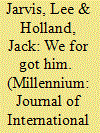

|
|
|
|
|
| Publication |
2014.
|
| Summary/Abstract |
This article explores how the death of Osama bin Laden was narrated by the Obama administration between the night of his killing and the 2012 State of the Union address. Three aspects of this unfolding story, in particular, are explored: i) descriptions of the operation itself; ii) constructions of bin Laden's life and character; iii) accounts of the significance and likely consequences of his killing. The article argues that the narration of these events was characterised, first, by considerable discursive continuity with the war on terrorism discourse of George W. Bush, and, second, by a gradual removal or 'forgetting' of bin Laden and the circumstances of his death. Each of these dynamics, we argue, contributed to the legitimisation of his killing, demonstrating the importance of narrative remembrance and forgetting alike for the conduct and justification of liberal violence.
|
|
|
|
|
|
|
|
|
|
|
|
|
|
|
|
| 12 |
ID:
140866
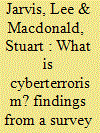

|
|
|
|
|
| Summary/Abstract |
This article reports on a recent survey designed to capture understandings of cyberterrorism across the global research community. Specifically, it explores competing views, and the importance thereof, amongst 118 respondents on three definitional issues: (a) the need for a specific definition of cyberterrorism for either policymakers or researchers; (b) the core characteristics or constituent parts of this concept; and (c) the value of applying the term “cyberterrorism” to a range of actual or potential scenarios. The article concludes by arguing that while a majority of researchers believe a specific definition of cyberterrorism is necessary for academics and policymakers, disagreement around what this might look like has additional potential to stimulate a rethinking of terrorism more widely.
|
|
|
|
|
|
|
|
|
|
|
|
|
|
|
|
|
|
|
|
|